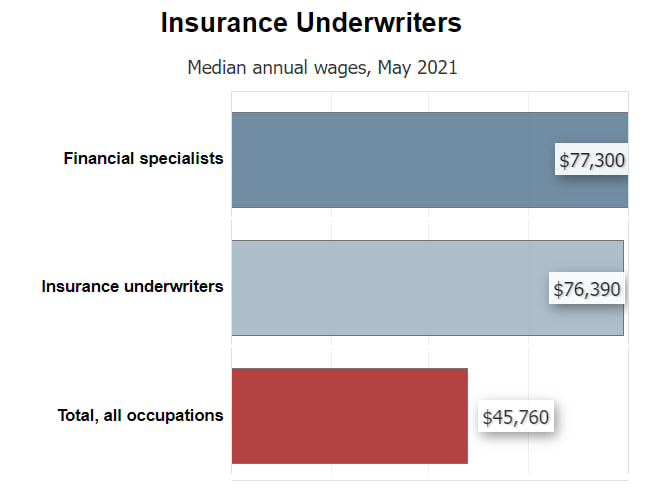Exploring the Income Potential of an Insurance Underwriter

Insurance underwriters are professionals who assess and analyze insurance applications to determine whether to provide insurance coverage, and if so, at what price. They evaluate risks and calculate premiums based on a range of factors, such as the applicant's health, financial history, and other relevant information.
Insurance underwriters play a vital role in the insurance industry by managing risk for insurance companies. They help to ensure that insurance companies remain financially viable by carefully assessing the level of risk associated with each policy application and determining the appropriate premium.
This article aims to provide insight into the income potential of insurance underwriters. We will analyze the national average salary for insurance underwriters, as well as the factors that affect salaries, and compare them to salaries of similar professions.
Average Salary of Insurance Underwriters
According to the Bureau of Labor Statistics (BLS), the national average salary for insurance underwriters as of May 2021 was $76,390 per year. The lowest 10 percent earned less than $47,330, and the highest 10 percent earned more than $126,380.

Source: U.S. Bureau of Labor Statistics, Occupational Employment and Wage Statistics
Compared to other similar professions, such as claims adjusters, appraisers, examiners, and investigators, insurance underwriters earn a higher average salary. However, compared to other financial professionals, such as accountants and financial analysts, insurance underwriters earn a slightly lower average salary.
Factors Affecting Insurance Underwriter Salaries
1. Experience and education
Experience and education are significant factors affecting the salary of insurance underwriters. Those with more experience and education are likely to earn higher salaries compared to their counterparts with less experience and education.
2. Geographic location
Geographic location is another significant factor that can influence insurance underwriters' salaries. Underwriters in metropolitan areas and areas with higher costs of living may earn more than those in less populated areas.
3. Industry and company size
The industry and company size that an insurance underwriter works for can also have an impact on their salary. Larger insurance companies and those in high-paying industries, such as finance and professional services, may offer higher salaries.
4. Professional certifications and designations
Insurance underwriters who hold professional certifications and designations may earn higher salaries than those who do not. Certifications such as the Chartered Property Casualty Underwriter (CPCU) designation can demonstrate a high level of expertise and may lead to higher salaries.
Top-Paying Industries for Insurance Underwriters
According to the BLS, the highest-paying industries for insurance underwriters as of May 2021 were:
- Securities, Commodities, and Financial Services: $111,360
- Management, Scientific, and Technical Consulting Services: $102,090
- Insurance Carriers: $81,850
Within these industries, salaries for insurance underwriters can vary depending on experience, education, and other factors. For example, insurance underwriters in the Securities, Commodities, and Financial Services industry may earn more if they specialize in high-risk products, such as derivatives.
Salaries for insurance underwriters can also vary significantly between industries. For example, insurance underwriters in the Management, Scientific, and Technical Consulting Services industry earn an average of $102,090 per year, while those in the Insurance Carriers industry earn an average of $81,850 per year.
Note:
Some Underwriters can work remotely, using online tools and communication technologies to collaborate with colleagues and clients.
Future of Insurance Underwriting Salaries: Trends and Projections
Trends such as the increasing use of automation and artificial intelligence in underwriting could potentially impact the demand for underwriters and their salaries.
The BLS projects that employment of insurance underwriters will decline slightly in the coming years due to increased automation. However, opportunities may still exist for underwriters who specialize in certain areas or possess advanced technical skills.
Advancements in underwriting technology, such as predictive analytics and machine learning, could potentially impact underwriter salaries by increasing efficiency and productivity, leading to fewer job openings and potentially lower salaries.

Photo: RODNAE Productions/Pexels
Insurance underwriters play a critical role in the insurance industry, and their salaries can be influenced by factors such as experience, education, and geographic location. The highest-paying industries for insurance underwriters include securities, commodities, and financial services, as well as management, scientific, and technical consulting services.
While salaries for insurance underwriters may not be as high as those in other financial professions, there are opportunities for career advancement and salary growth. Insurance underwriters can increase their earning potential by gaining professional certifications and designations and specializing in certain areas.
Despite potential challenges and changes in the industry, there will likely continue to be a demand for insurance underwriters. Pursuing a career as an insurance underwriter can be a rewarding and fulfilling path, with opportunities for growth and advancement.
- Insurance underwriters play a critical role in the insurance industry by assessing risk and determining policy premiums.
- The median annual salary for insurance underwriters in the US was $76,390 as of May 2021.
- Factors that can affect insurance underwriter salaries include experience, education, geographic location, industry, and professional certifications and designations.
- The highest-paying industries for insurance underwriters include securities, commodities, financial services, and management, scientific, and technical consulting services.
- Trends such as increased automation and advancements in underwriting technology could potentially impact the demand for underwriters and their salaries.
FAQ
What are some emerging trends in the field of Insurance Underwriting?
Some emerging trends in the field of Insurance Underwriting include the use of big data and artificial intelligence to assess risk and automate underwriting processes, the development of new insurance products to address emerging risks such as cyber and climate change, and the increasing importance of sustainability and ESG (Environmental, Social, and Governance) factors in underwriting decisions.
What are some ethical considerations for Insurance Underwriters?
Insurance Underwriters must make decisions that balance the interests of the insurer, the insured, and the general public. They must ensure that premiums are fair and affordable, that risks are accurately assessed, and that claims are processed fairly and promptly. Underwriters must also comply with laws and regulations governing the insurance industry and avoid conflicts of interest or bias.
What are the key skills required to become a successful Insurance Underwriter?
Some of the key skills required to become a successful Insurance Underwriter include analytical and critical thinking skills, attention to detail, good communication skills, sound judgment, knowledge of insurance policies and regulations, and the ability to work under pressure.
What are the typical job duties of an Insurance Underwriter?
The typical job duties of an Insurance Underwriter include reviewing insurance applications, assessing the risk involved, determining the premium rates, analyzing data, collaborating with other professionals such as actuaries and agents, negotiating terms with clients, and maintaining accurate records.